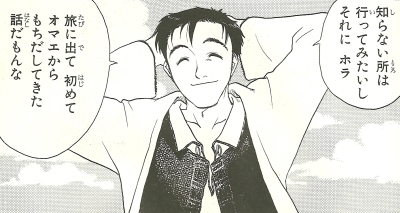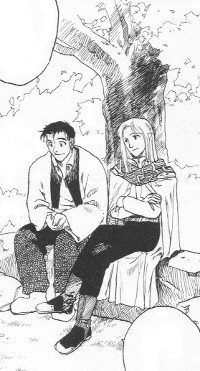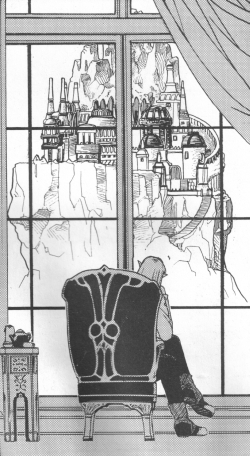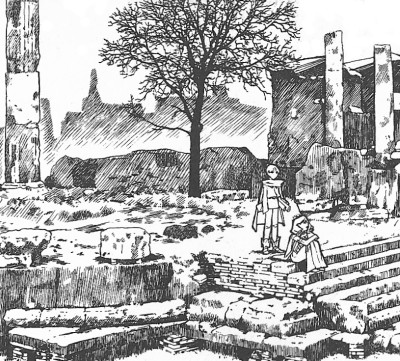|
Gloriously drawn and perceptively written, Vheen Hikuusen is a shining addition to the Lunar world. It is remarkable, however, not only in the success of its standalone story but in its unique contributions to the canon. Here are the three biggest.
 It gives us a look at Dain's youthful personality and his past friendship with Ghaleon. Ghaleon and Dyne's friendship and ultimate sundering is, in the end, the great motive force behind Silver Star, yet its details and nature - not to mention one of the two parties involved - remain largely a mystery. The game is admirable in how much it is able to communicate about the relationship through the townspeople's awestruck or sorrowful remembrances, Ghaleon's bitter outbursts that spring up from a deep, long-simmering well, or Laike's reluctant confessions, ruefully recounting a truth with which he has come to terms. Still, there are questions left. And, well - we get all of the tragedy; is it too much to ask for a little of the happy times? It gives us a look at Dain's youthful personality and his past friendship with Ghaleon. Ghaleon and Dyne's friendship and ultimate sundering is, in the end, the great motive force behind Silver Star, yet its details and nature - not to mention one of the two parties involved - remain largely a mystery. The game is admirable in how much it is able to communicate about the relationship through the townspeople's awestruck or sorrowful remembrances, Ghaleon's bitter outbursts that spring up from a deep, long-simmering well, or Laike's reluctant confessions, ruefully recounting a truth with which he has come to terms. Still, there are questions left. And, well - we get all of the tragedy; is it too much to ask for a little of the happy times?
The games label Dain as Ghaleon's "idol"; they seemingly assume that Ghaleon was Dain's younger tag-along, star-struck by his hero, who couldn't deal with him making or accepting (depending on the game) what he saw as an immoral decision. The idea always made Ghaleon seem immature, though; if anything, his misdeeds are borne from a lack of youthful hope and faith, not from a surfeit of it.  Casting the relationship as father-son, while a 180-degree twist from the initially expected, makes it fall in line thematically with the rest of Silver Star. Lunar 1 is a tale of children taking over the world from their parents; its two great benefactors, Althena and Dyne, are parents who want to entrust the world to the next generation, while its antagonist is a parent who won't let his children grow up. Casting the relationship as father-son, while a 180-degree twist from the initially expected, makes it fall in line thematically with the rest of Silver Star. Lunar 1 is a tale of children taking over the world from their parents; its two great benefactors, Althena and Dyne, are parents who want to entrust the world to the next generation, while its antagonist is a parent who won't let his children grow up.
Dain is not a character given to pretense or introspective change, but it might not be remiss to wonder what he was like in his Four Heroes zenith; the Laike we meet in Silver Star has been living as another person away from his old life for fifteen years. Ghaleon is a fan-favorite character, and painting a portrait of "the only person whom [his] heart held dear" (to quote Younenki no Owari) is an extraordinarily tall order. Funato's Dain totally works, though. In "Tamashii no Kokuhaku," we see how Ghaleon and Dain work with each other, bring out the best in each other. The story puts Dain in a crisis that demonstrates the best of his nature but awakens his sense of moral responsibility and foreshadows his future great decision. Lunar's heroes are hailed for, as Funato puts it, their ability to live "by their guts and their big hearts," and it is fitting that Dain, he who would become the greatest Dragonmaster, is the true embodiment of this philosophy. Who could stand to see such a gentle soul hurt; who could stand to be rebuked by him? Dain is everything the goddess Althena herself is supposed to be; he is totally worth casting aside the entire world.
 It gives Ghaleon an enlightening past and cultural background. Ghaleon's physical appearance in the games is a mystery - he is literally one of a kind. Not a single other elf appears throughout the story. It is in "Kokuhaku Suru Kioku" that we learn there are no other elves, at least not in his home; Ghaleon's culture was dying when he was born. It gives Ghaleon an enlightening past and cultural background. Ghaleon's physical appearance in the games is a mystery - he is literally one of a kind. Not a single other elf appears throughout the story. It is in "Kokuhaku Suru Kioku" that we learn there are no other elves, at least not in his home; Ghaleon's culture was dying when he was born.
Vheen Hikuusen takes a nagging oddity and develops from it a backstory that builds on and enriches our previous knowledge of the character instead of being distractingly out of the blue. Vheen has always been considered Ghaleon's home; here, we learn that it was his race's ancestral home, now occupied by strangers. It now makes a little more sense how Ghaleon could take charge of what we know as the Vile Tribe with seeming relative ease. It is a natural progression from what we learn in SSS Cadin, that differences in degree of magic power will affect a mazoku's form. If we pastiche the book to TSS, it explains the monstrous form he takes at its end, akin to Xenobia's.
More significantly, though, making Ghaleon part of an elder, dying race resonates with the loneliness and sense of parental responsibility that defines the character. Making him old - very old - and the Dain incident the very last (though decisive) in a chain of prompts instead of its beginning gives Ghaleon's turn more dramatic significance; it's a defeat after a long struggle, a despairing breakdown after a long and grinding weariness. Meanwhile, directly tying him to a fallen people underlines the tragedy of transcending bad circumstances and attaining the highest only to turn one's back on it all.
(One more note: the supporting cast of KSK is entirely original, and the characters almost all work. That itself is a resounding achievement, given the propensity of such creations to lapse into Mary Sue territory.)
 It gives an adult perspective on a familiar story that enriches the source material. Silver Star is a charming tale, but it is written from the perspective of an entitled child. Its world and obstacles exist to validate its young heroes, perhaps best personified in Arhes's knight fantasy come true - becoming an adult, in the world of the story, means getting everything you want. Lunar is youthful na´vetÚ incarnate, and so it seems unfair to condemn it for a lack of pragmatism and excess of narcissism, but it is frustrating in how it brings in complex dilemmas (the subjugation of a race long past their forefathers' crime; the perceived abuse of a friend; the safety of the many vs. an individual's well-being) and weighs them from a simplistic and self-absorbed perspective. Parts of these stories are left out by dint of being beyond the young leads' experience or capacity to understand. It gives an adult perspective on a familiar story that enriches the source material. Silver Star is a charming tale, but it is written from the perspective of an entitled child. Its world and obstacles exist to validate its young heroes, perhaps best personified in Arhes's knight fantasy come true - becoming an adult, in the world of the story, means getting everything you want. Lunar is youthful na´vetÚ incarnate, and so it seems unfair to condemn it for a lack of pragmatism and excess of narcissism, but it is frustrating in how it brings in complex dilemmas (the subjugation of a race long past their forefathers' crime; the perceived abuse of a friend; the safety of the many vs. an individual's well-being) and weighs them from a simplistic and self-absorbed perspective. Parts of these stories are left out by dint of being beyond the young leads' experience or capacity to understand.
Vheen Hikuusen, particularly "Kokuhaku Suru Kioku," remedies this by witnessing the same changes from the parents' perspective as well as the children's. It reaches the same conclusions - one must have faith in one's friends and the next generation, looking to the future instead of succumbing to bitterness - but doesn't shortchange the human (and mazoku) cost involved or pave over the feelings caused in the transition. The manga examines these issues through more mature storylines that emphasize character growth over validation; in "Kokuhaku," there are no villains, and the struggle is resolved (so much as it can be) by a child growing to understand his deceased big brother rather than by beating anybody up. It also offers a more realistic triumph than saving the world: yes, we will all pass away one day, and nothing will last forever, but we can influence the lives of the next generation for the better and pass on what we've learned.
As discussed previously, Silver Star is a tale of children inheriting the world from their parents, so it's tough to give the above issues full consideration given that focus; it's a young people's story in the end. Vheen Hikuusen thereby fulfills the mission of a gaiden in the best way - it fleshes out material that couldn't be addressed in the source while lending new dimension to the original. Its parental perspective allows Silver Star its na´vetÚ while giving proper weight to the dilemmas it raises - and demonstrates how the moral of Silver Star is stronger, not weaker, when these those issues are directly addressed.
Back.
|